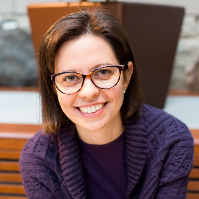Astrophysicist wins CAREER award
Assistant Professor Raffaella Margutti will use the award to advance her research on the collision of black holes and neutron stars
By Rebecca Lindell
Raffaella Margutti, an assistant professor in the Department of Physics and Astronomy, has won a prestigious Faculty Early Career Development (CAREER) Award from the National Science Foundation.
The CAREER award is the foundation’s most prestigious honor for junior faculty members. It supports promising young researchers who exemplify the role of teacher-scholar through the combination of outstanding research and education.
“This award will allow me to work effectively unrestricted at the very forefront of scientific research and discoveries in the new era of time-domain multi-messenger astrophysics,” Margutti said.
An astrophysicist, Margutti studies the biggest explosions and disruptions in the universe, including supernovae, gamma-ray bursts, compact stellar mergers and tidal disruption events. She will use the CAREER award to learn more about what happens when the densest objects in the universe — black holes and neutron stars — collide. Her $853,897 award will span a period of five years.
A new era of investigation
Violent collisions of black holes and neutron stars produce bursts of light that can be detected by telescopes, as well as gravitational waves. Indeed, in 2017 astronomers detected gravitational waves and light from the merger of a neutron star for the first time. This joint detection ushered in the beginning of a new era of investigation: the era of “multi-messenger astrophysics.”
 “Upcoming astronomical surveys, such as the Legacy Survey of Space and Time performed by the Vera Rubin Observatory, will dramatically extend our knowledge of the restless universe we live in,” Margutti said.
“Upcoming astronomical surveys, such as the Legacy Survey of Space and Time performed by the Vera Rubin Observatory, will dramatically extend our knowledge of the restless universe we live in,” Margutti said.
Margutti’s project capitalizes on this guaranteed stream of data, adding the unique perspective of a truly multi-wavelength characterization of mergers of neutron stars and black holes. The investigator will work with high school teachers to develop curricular material on compact-object mergers, and to guide their students in research projects.
Multisensory astrophysics
Margutti’s group will also work with visually impaired scientists and collaborate with professional musicians to translate astronomical measurements into sound to make multi-messenger astrophysics accessible to all — and to engage the wider public with a multisensory experience.
“Music can strike chords deep into humans,” said Margutti. “We will merge music and astrophysics in our attempt to reach the widest possible public and share the latest discoveries at the frontier of a completely new field of investigation.”
Back to top